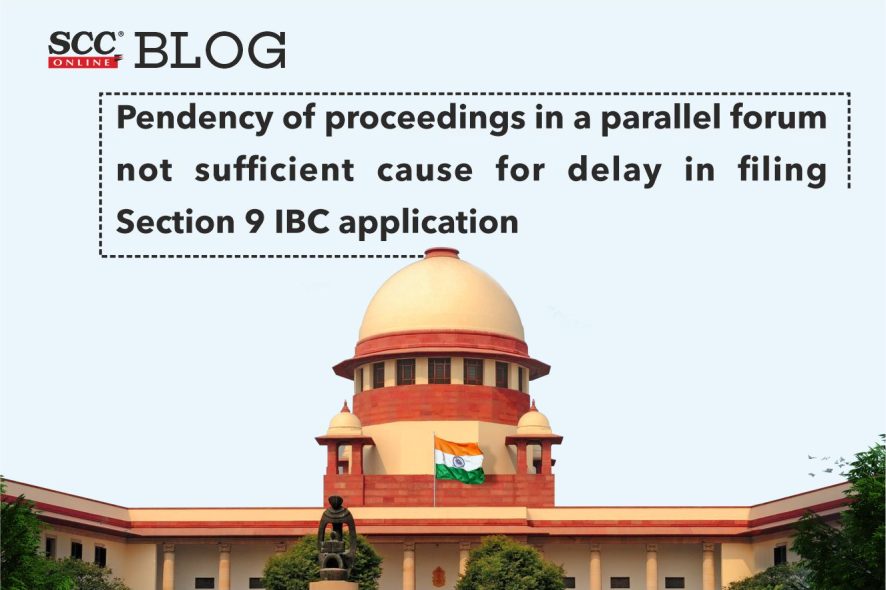Supreme Court: Dealing with the issue of limitation in cases under the Insolvency and Bankruptcy Code, 2016 (IBC), the bench of Indira Banerjee* and JK Maheshwari, JJ has held that the pendency of the proceedings in a parallel forum is not sufficient cause for the delay in filing an application under Section 9 of the IBC if by the time the application was filed, the claim had become barred by limitation.
Background
On or about 22.12.2015, the Respondent filed a Winding Up petition dated 04.07.2015 in the Madras High Court.
On 05.01.2016, the High Court returned the Winding Up petition to the Respondent for curing of defects. The Winding Up petition was represented on 03.02.2016, but again returned on 24.05.2016 with an endorsement to comply with the defects as intimated earlier.
The IBC came into force on 01.12.2016. Thereafter the Respondent issued a demand notice on 14.11.2017 under Section 8(1) calling upon the Appellant to repay its dues.
On 30.03.2018, the Respondent filed petition under Section 9 of the IBC for initiation of the Corporate Insolvency Resolution Process (CIRP) in the NCLT. By an order dated 02.01.2019, the Adjudicating Authority (NCLT) rejected the application as barred by limitation.
The Respondent appealed to the NCLAT under Section 61 of the IBC. By the impugned judgment and order, the NCLAT set aside the order dated 02.01.2019 passed by the Adjudicating Authority (NCLT) rejecting the application of the Respondent under Section 9 of the IBC and remitted the case to the Adjudicating Authority for admission after notice to the parties. The NCLAT held :-
“8. In the present case, it is not in dispute that right to apply under Section 9 accrued to the Appellant on 1st December, 2016, when ‘I&B Code’ came into force. Therefore, we find that the application under Section 9 filed by the Appellant is within the period of three years from the date of right to apply accrued.”
Analysis
The provisions of the Limitation Act are applicable to proceedings under the IBC as far as may be. Section 14(2) of the Limitation Act which provides for exclusion of time in computing the period of limitation in certain circumstances, provides as follows:
“14. Exclusion of time of proceeding bona fide in court without jurisdiction.— (1) … (2) In computing the period of limitation for any application, the time during which the applicant has been prosecuting with due diligence another civil proceeding, whether in a court of first instance or of appeal or revision, against the same party for the same relief shall be excluded, where such proceeding is prosecuted in good faith in a court which, from defect of jurisdiction or other cause of a like nature, is unable to entertain it.”
Similarly, under Section 18 of the Limitation Act, an acknowledgment of present subsisting liability, made in writing in respect of any right claimed by the opposite party and signed by the party against whom the right is claimed, has the effect of commencing of a fresh period of limitation, from the date on which the acknowledgment is signed. However, the acknowledgment must be made before the period of limitation expires.
Proceedings in good faith in a forum which lacks jurisdiction or is unable to entertain for like nature may save limitation. Similarly, acknowledgment of liability may have the effect of commencing a fresh period of limitation.
The Supreme Court observed that for the purpose of limitation, the relevant date is the date on which the right to sue accrues which is the date when a default occurs.
The condition precedent for condonation of the delay in filing an application or appeal, is the existence of sufficient cause. Whether the explanation furnished for the delay would constitute “sufficient cause” or not would be dependent upon facts of each case. However, there cannot be any straitjacket formula for accepting or rejecting the explanation furnished by the Appellant/applicant for the delay in taking steps.
When an appeal is filed against an order rejecting an application on the ground of limitation, the onus is on the Appellant to make out sufficient cause for the delay in filing the application. The date of enforcement of the IBC and/or the date on which an application could have first been filed under the IBC are not relevant in computation of limitation.
“It would be absurd to hold that the CIRP could be initiated by filing an application under Section 7 or Section 9 of the IBC, within three years from the date on which an application under those provisions of the IBC could have first been made before the NCLT even though the right to sue may have accrued decades ago.”
Further, the fact that an application for initiation of CIRP, may have been filed within three years from the date of enforcement of the relevant provisions of the IBC is inconsequential. What is material is the date on which the right to sue accrues, and whether the cause of action continuous.
In the case at hand, the last acknowledgment was in 2013 and the Madras High Court neither suffered from any defect of jurisdiction to entertain the winding up application nor was unable to entertain the winding up application for any other cause of a like nature.
As the limitation for initiation of winding up proceedings in the Madras High Court stopped running on the date on which the Winding Up petition was filed, the initiation of proceedings in Madras High Court would not save limitation for initiation of proceedings for initiation of CIRP in the NCLT under Section 7 of the IBC.
[Tech Sharp Engineers Pvt Ltd v. Sanghvi Movers ltd, 2022 SCC OnLine SC 1249, decided on 19.09.2022]
*Judgment by: Justice Indira Banerjee






